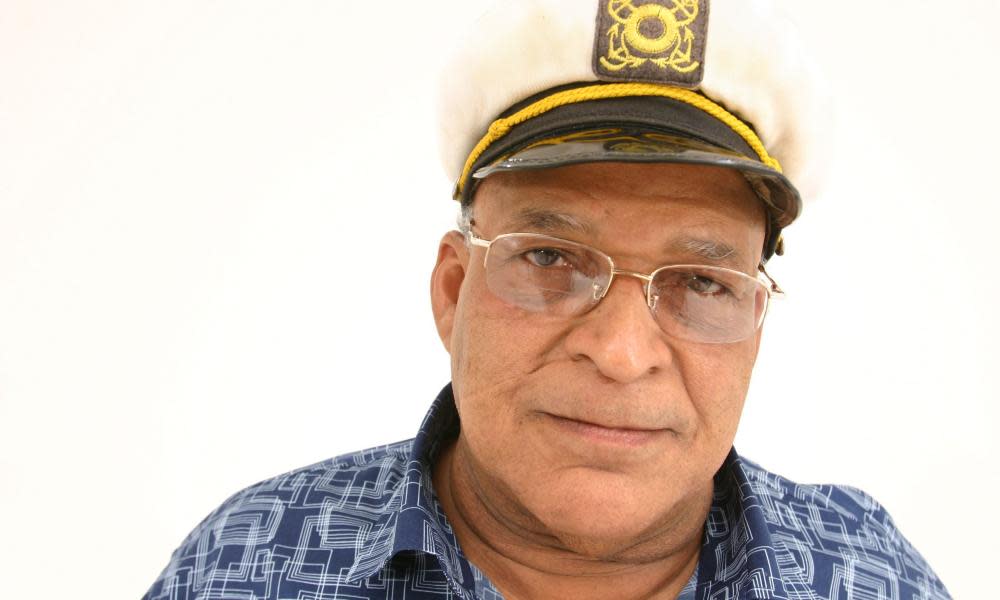Bunny 'Striker' Lee: the deal-maker whose kindness shaped the sound of reggae

I first met Bunny “Striker” Lee in Jamaica in the mid-1990s while researching my book Bass Culture: When Reggae Was King. Like so many of the men and women we in London considered reggae superstars, he was listed in the Kingston phone book; when this complete stranger rang to ask if he could spare an hour for an interview, he didn’t hesitate. The next evening, 10 minutes before the arranged time, Bunny Lee was sitting outside my hotel reading a newspaper. On the journey to his studio he insisted on stopping to buy takeaway chicken dinners for us and his engineer, Newton, who was driving.
Related: Bunny 'Striker' Lee, Jamaican reggae producer, dies aged 79
He talked to me for over two hours, relating a succession of insightful and hilarious stories of the Kingston reggae scene in the 60s and 70s. As we got into the car for my lift back, he suddenly asked if I’d spoken to John Holt. When I said I hadn’t, Lee’s eyes lit up. Despite it being 10.30pm, we were off to call for Holt. Lee seemed genuinely disappointed when we got to the Holt residence and John wasn’t in. He offered to take me there another day, but I was heading back to Florida the next afternoon.
This was, I would find out, textbook Bunny Lee: his incredible generosity; his love of fixing situations and doing favours. I know as a businessman he took no prisoners, but while writing the book it was still almost impossible to find anybody – in the reggae business or otherwise – with a bad word to say about him. On a community level, he negotiated between local residents and the law or city officials; he stood bail, gave loans and mediated disputes, domestic and otherwise. He revelled in this position as a Mr Fixit, not for the power it gave him but because he simply liked helping people.
It was Bunny Lee who facilitated King Tubby buying Byron Lee’s old mixing desk, giving the soon-to-be dub master his first multi-track board with sliders as opposed to less responsive rotary controls. He would often be called in to act as a middleman between artists and producers in conflict. And he was among the first to exploit the UK market for Jamaican music in the mid-60s, doing deals with the Willesden-based Palmer brothers and the fledgling Trojan records to license reggae records in Britain.

It was Lee’s ability to move between layers of society, both in Kingston and London, with ease and good humour that made his dealings so successful, and it was that charm and charisma that underpinned his first job in the music business. In the early 60s, he was a record promotions man first for Duke Reid, then Ken Lack’s Caltone label, meaning he would visit different sound systems to finesse the operators into playing his records. As a younger and considerably slimmer man, Lee was one of the most respected dancers on the Kingston circuit, and would present his tunes with nimble moves to demonstrate their appeal.
The Kingston sound system world was always tribal, with different sets of supporters staying loyal to each outfit and its music (the majority of sound systems were owned by record producers). Travelling round the various dances gave Lee an insight into what people across the board were grooving to. As a plugger in the mid-60s he witnessed the beat speeding up slightly and the crowds enjoying a looser dance they called the “reggae”. Ever the opportunist, Lee was ready to start making records to go along with it.
The string of hits he produced during the late 60s was so steady it led to his enduring nickname “Striker” – the man who couldn’t miss. His catalogue read like a who’s-who of early reggae, including Slim Smith, Lester Sterling, the Uniques, John Holt, Pat Kelly, Delroy Wilson and Eric Donaldson, and such classics as Better Must Come, Cherry Oh Baby, My Conversation and Stick By Me. During the next decade he saw dub as an art form in itself rather than just a B-side, encouraging King Tubby’s adventurousness, and was involved in the early careers of Philip Smart and King Jammy.
Related: Cultural revolutions: how dub reggae’s beats conquered 70s Britain
Also around this time, Lee became among the first to use the same backing track – or riddim – multiple times with different singers or mixes. This wasn’t unexpected: for all his generosity he didn’t waste money. (Other than the recording equipment, his studio looked like a secondhand furniture graveyard; when he dropped me back at my hotel that night, he went into reception to ask if anybody had handed in the newspaper he’d left behind.) Lee’s swansong was the excellent work he did with the late-70s DJs such as Dennis Alcapone, Tapper Zukie, U-Roy and I-Roy.
After that evening in Kingston, I would regularly run into Bunny Lee in Fatman’s bar, near Clissold Park in north London. He’d be telling stories to a beaming proprietor or enjoying a meal and a drink with an old friend. Most people passing through seemed to know him, and he always had time to talk to each of them.


